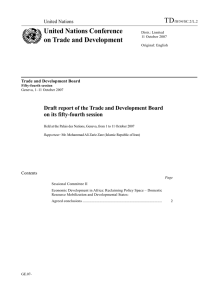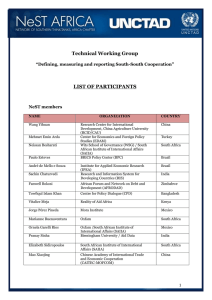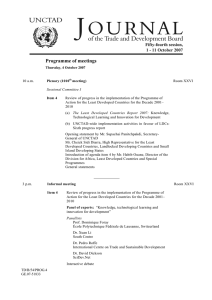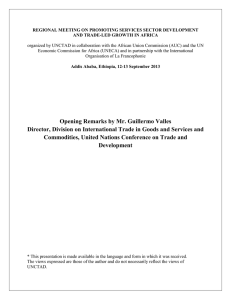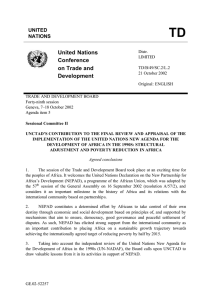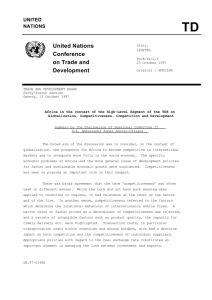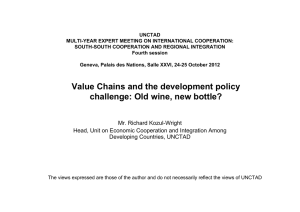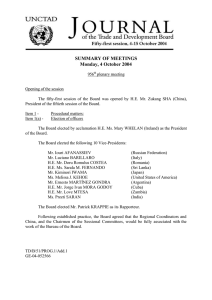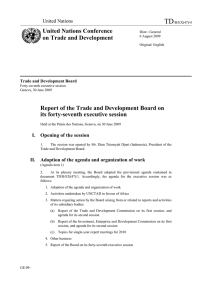TD United Nations Conference on Trade and Development United Nations
advertisement
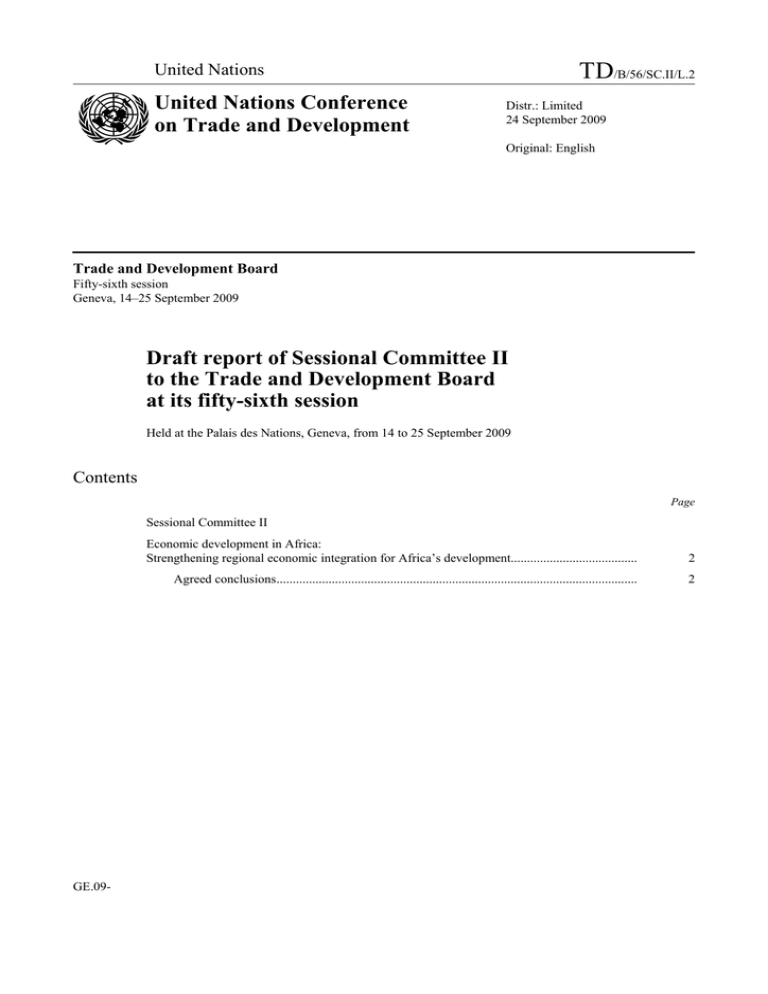
TD/B/56/SC.II/L.2 United Nations United Nations Conference on Trade and Development Distr.: Limited 24 September 2009 Original: English Trade and Development Board Fifty-sixth session Geneva, 14–25 September 2009 Draft report of Sessional Committee II to the Trade and Development Board at its fifty-sixth session Held at the Palais des Nations, Geneva, from 14 to 25 September 2009 Contents Page Sessional Committee II GE.09- Economic development in Africa: Strengthening regional economic integration for Africa’s development....................................... 2 Agreed conclusions............................................................................................................... 2 TD/B/56/SC.II/L.2 Sessional Committee II Economic development in Africa: Strengthening regional economic integration for Africa’s development Agreed conclusions The Trade and Development Board 1. Expresses its appreciation for the quality of the 2009 report by the UNCTAD secretariat entitled Economic Development in Africa: Strengthening Regional Economic Integration for Africa’s Development, and encourages the secretariat to continue its research and analysis on Africa’s development challenges; 2. Notes that the report’s key message – that regional integration should be used to address Africa’s long-standing structural weaknesses, which have lowered the long-term growth performance of many countries, increased their economic vulnerability and undermined their efforts to reduce poverty – indicates that the need to refocus on regional integration is made more pressing by the current financial and economic crises; 3. Acknowledges that Africa has made progress in integrating its economies over the last 50 years and that the impetus for regional integration is now stronger than ever before, as evidenced by the constant efforts of the African Union to deepen the continent’s integration agenda, but notes with concern that regional efforts have not generated the expected increase in intra-African trade, investment and labour mobility; 4. Recognizes that building and maintaining hard infrastructure including roads, railways, ports and telecommunications, and soft infrastructure such as improvements in the policy and regulatory environment and in customs and border procedures, as well as other trade facilitation measures, should be a priority in promoting regional economic integration; 5. Considers that deeper regional financial integration can help to promote intra-African investment flows; 6. Reaffirms that free movement of persons across Africa is a central component of regional integration and urges regional bodies to put in place mechanisms that will ensure that labour mobility benefits both host and sending countries, in order to encourage all countries to implement existing provisions governing labour mobility, tailored to countries’ specific contexts; 7. Recognizes that for each African country, regional integration is a priority, and emphasizes that integration can be most effectively achieved as part of a broader longterm development strategy and countries should commit to implement all the provisions governing regional integration as appropriate, privileging dialogue at the regional level; 8. Urges Africa’s development and economic partners to help sustain the continent’s economic development by supporting its regional integration priorities, including in the area of trade, with a particular emphasis on the development of infrastructure and of human capacity to manage and maintain it, as provided in the infrastructure development strategy of the New Partnership for Africa’s Development (NEPAD) and through Aid for Trade; 9. Recognizes the importance of South–South cooperation in contributing to regional cooperation, and the importance of all development partners supporting Africa’s regional economic integration agenda and integrating this agenda in their cooperation 2 TD/B/56/SC.II/L.2 programmes with Africa; and requests UNCTAD, through the concerted application of its three pillars, to conduct further work in this regard; 10. Encourages the African Union as well as its regional economic communities and the African Development Bank to strengthen their role in promoting African integration; 11. Requests UNCTAD to produce a report on the feasibility of creating a webbased network linking the various African regional economic communities and dedicated to promoting intraregional investment and trade; 12. Encourages UNCTAD, within its mandate and as agreed in the Accra Accord, to continue to undertake insightful and critical analysis with respect to Africa and to widen the dissemination of its research findings; 13. Requests the Secretary-General of UNCTAD to review the human resource requirements of the Division for Africa, Least Developed Countries and Special Programmes, in light of its mandates and activities, and to report to the next regular session of the Trade and Development Board with a plan to provide the Division for Africa, Least Developed Countries and Special Programmes with adequate resources while respecting UNCTAD’s agreed overall budget level. 3
